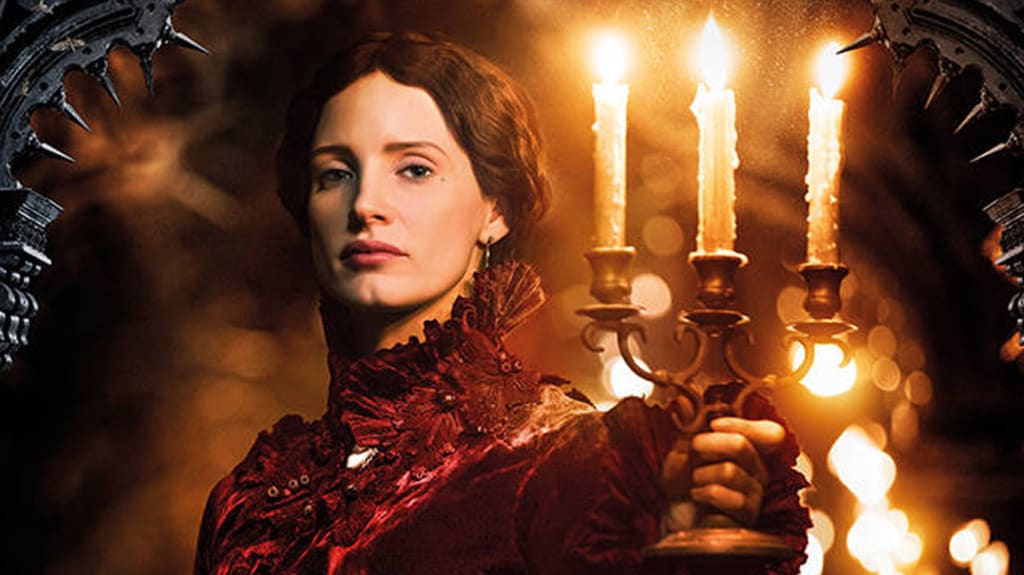Antisocial Personality Disorder in Lady Lucille Sharpe of 'Crimson Peak'
Diving into Horror Character Analysis (Spoilers Within)

A Summary of the Case of Lady Lucille Sharpe
To briefly introduce the character of Lady Lucille Sharpe from the psychological horror masterpiece of Crimson Peak created by Guillermo del Torro, one might say that terms like “psycho,” “evil-doer,” “whore,” and “main antagonist” definitely fit. However, the genius behind the creation of Lady Lucille Sharpe may go much deeper than she would appear on the surface. When they were children, Lucille and her brother Thomas grew up together and began to relate with one another on a much deeper level than may be expected of siblings. Often abused by their mother, the two siblings soon became the only safe place they could find. As this “safe-feeling” between them grew, an incestuous relationship developed between them. Lucille became vividly obsessed with protecting Thomas, even going so far as to kill their mother when she forced Lucille to kill the child born from the “sin” between the two siblings. After Lucille easily coined her mother’s death as an accident, she became obsessed with managing her image and devised a plot in which she used Thomas to secure brides. Shortly after the damsel’s marriage to Thomas, Lucille would deviously ween the bride’s health from them and secure what would have been Thomas and his wife’s inheritance as Thomas’ inheritance.
When Thomas’ admiration and love seems to dissipate from Lucille and he finds happiness with the wife of the movie’s focus, Edith, Lucille grows furiously jealous and treats Edith coldly. As Edith begins to grow weaker, she begins to suspect Lucille and stops eating entirely. Edith begins to receive more care and support from Thomas than Lucille had ever witnessed in previous brides, causing her envy to grow as Thomas wishes for his wife’s health while his sister persistently continues her plans. Though conflicted, Thomas eventually sides with Edith. This results in something akin to a manic break in Lucille, and she kills Thomas as easily as she had killed her mother. In her attempt to kill Edith immediately after Thomas’ death, she experiences a vision in which she sees her brother’s ghost. This gives Edith enough time to defend herself by hitting Lucille with a shovel and consecutively snapping her neck.
Diagnosis
The diagnosis criteria of antisocial personality disorder that Lucille exhibits throughout her lifetime, presumably starting around the age 15, follow. Due to the use of exploitation in murder, Lucille demonstrates a “failure to conform to social norms with respect to lawful behaviors, as indicated by repeatedly performing acts that are grounds for arrest” (Ulrich, 2018). A case may also be made for the fact that she engages in an incestuous affair with her brother, Thomas, on multiple occasions throughout her life, starting at an adolescent age until her death. During the time period in which the movie is set (Victorian Era England), this is also grounds for arrest. Lucille also displays “Deceitfulness, as indicated by repeated lying, use of aliases, or conning others for personal profit or pleasure,” (Ulrich, 2018) many times starting from a young age. She lies often, assigns aliases to both her brother and herself, and exploits the hearts of young maidens using devious plans to be acted upon by her brother. In addition, Lucille shows “irritability and aggressiveness” as well as “lack of remorse, as indicated by being indifferent to or rationalizing having hurt, mistreated, or stolen from another” (Ulrich, 2018). While she also displays many other symptoms related to antisocial personality, these are the most prominently displayed symptoms from near the age of 15. Thus, I would make the case for a potential diagnosis of severity in antisocial personality disorder.
Potential Treatment Options (Assuming Patient is Currently Not Deceased at Time of Diagnosis)
While treatments are typically ineffective, I would highly recommend some sort of detainment due to the fact that Lucille is proven to be dangerous and impulsive on multiple occasions. While it may not completely dissuade the disorder, I would suggest Lucille think about the issues of others and recommend a concept of morality. In addition, I would recommend that Lucille attend community therapy sessions while detained, in the hopes that she may at least gain some sort of sense of support from others and understand the concept of sympathy. While some studies are still needed, I would also likely recommend the use of atypical antipsychotic drugs for Ms. Sharpe. To be entirely honest, I see no reason that these treatment options would motivate Lady Lucille Sharpe to respond to her environment and current situation any differently. She is simply too obsessed with her brother’s betrayal, the death of Edith, and the death of those who would stand in the way of her profitable gain. However, I would recommend the before mentioned treatments simply in the hopes that she would find some reason to fight the disorder within herself.
Antisocial Personality Disorder Accuracies in Lady Lucille Sharpe
In Crimson Peak, Guillermo del Torro created quite an accurate and believable display of antisocial personality disorder in Lady Lucille Sharpe. His masterful display showed in his consistent direction of many of the common symptoms within the disorder. As listed above, Lady Lucille Sharpe showed the symptoms accurately and consistently throughout her lifetime (as far as can be known by watching the film.) I was quite impressed with the display presented of antisocial personality disorder within Lady Lucille throughout the film and would also vie for the likelihood of a disorder in her brother, Thomas, as well. Though, that case study would be for a different document entirely.
Antisocial Personality Disorder Inaccuracies Within Lady Lucille Sharpe
Due to the fact that the movie never mentions the age at which Lucille killed her mother, and, furthermore, the fact that it is unknown at which time Thomas and Lucille began their incestuous affair, it is hard to say whether or not the symptoms began at the age of 15 years old. This may add some discrepancies to the initial diagnosis and call for some adjustment in the case study. Furthermore, there is an occurrence in which Lucille hallucinates and sees the ghost of her recently murdered brother, Thomas, causing her to feel guilty for killing him. This feeling of guilt is not typically common in antisocial personality disorder and may have been presented for dramatic effect in the film. Despite these small inaccuracies which transpired in the film, probably for the sole purpose of effect, I sincerely believe that Toro did very well in presenting Lady Lucille Sharpe with subtle suggestions of antisocial personality disorder throughout the film.
References
Del Toro, Guillermo. (2015) Crimson Peak. Universal. 1 hr 59m.
Ulrich, Devin. (2018) Lecture 18: Personality Disorders. PSY 332-001: Abnormal Psychology. PPT 25-29.
About the Creator
Noctis 505
I am a cosplayer recently introduced to con-cosplaying and am quite pleased with the community I have found. In addition to cosplay, I love to write, read, play video games, and listen to music.
Welcome to bonified nerdom!






Comments
There are no comments for this story
Be the first to respond and start the conversation.